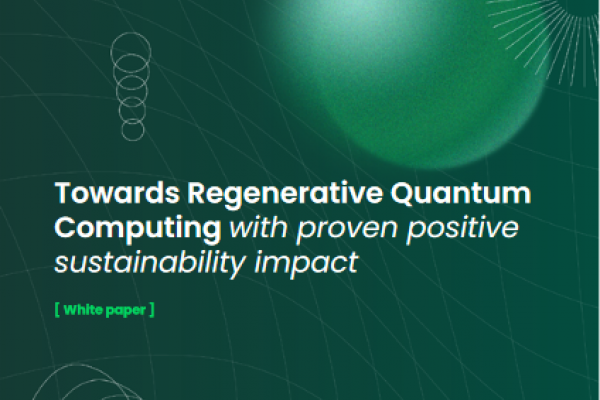HPCQS Shares Perspectives for Sustainable Quantum Computing in White Paper
Quantum technology harbours enormous potential for the further development of global society in many areas. In a groundbreaking white paper presented at the UN Climate Change Conference in Dubai in December 2023, the HPCQS consortium shares its contribution to the energy-efficient quantum computing of the future.
Initiated by HPCQS service partner PASQAL (the start-up that supplies the two quantum simulators for the supercomputing centres JSC in Germany and TGCC in France), the paper entitled "Towards Regenerative Quantum Computing with proven positive sustainability impact" was published on 5 December 2023. Stéphane Requena from HPCQS partner GENCI contributed the perspective by the quantum energy research community on sustainable quantum advantage to the document. He also provided the contribution of the France hybrid HPC quantum initiative (HQI) to decarbonising high-performance computing (HPC), which includes the TGCC supercomputing centre used by HPCQS. The second high-performance computing centre used by HPCQS – JSC in Jülich, Germany – has also contributed to the integration of quantum computing (QC) and energy advantage in the white paper. In the publication, HPCQS coordinator Kristel Michielsen from Forschungszentrum Jülich (FZJ) presents the supercomputer infrastructure at JSC, which provides users with a hybrid system of energy-efficient supercomputers that are or are being coupled with quantum computers from various initiatives and projects.
The white paper is part of an initiative by PASQAL to strengthen the sustainability aspect of quantum computing. The aim of the initiative is to foster the United Nations' sustainable development goals within and with the help of quantum technologies. The aspect of the relative sustainability advantage within quantum computing itself through the use of energy-efficient technology is highlighted in the white paper by the contributions of Stéphane Requena and Kristel Michielsen. Absolute sustainability involves the application of quantum computing for meaningful and sustainable use cases. This duality of relative and absolute sustainability of QC was brought to life during a hackathon in autumn 2023. The "Blaise Pascal [re]generative quantum challenge" aimed to develop quantum computing use cases that promote global sustainability. Use cases were submitted from the following areas:
- Sustainable agriculture
- Drug discovery
- Smart cities
- Smart grids and affordable/clean energy
- Sustainable transport, industry and circular economy
- Environment, climate, and biodiversity
PASQAL CEO and initiator of the campaign Georges-Olivier Reymond and HPCQS coordinator Kristel Michielsen were among the members of the jury that selected the three winning projects of the hackathon. In addition to the hackathon and white paper, numerous other activities were also part of the PASQAL sustainability initiative in QC.





